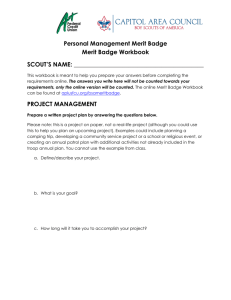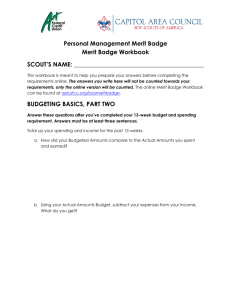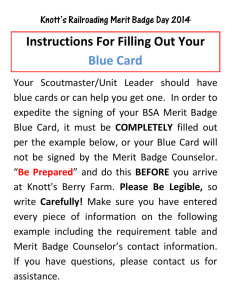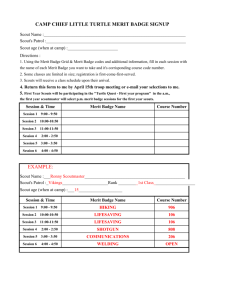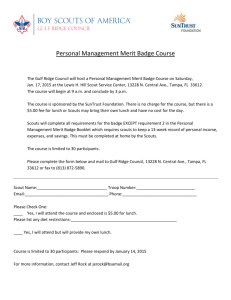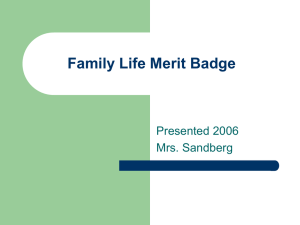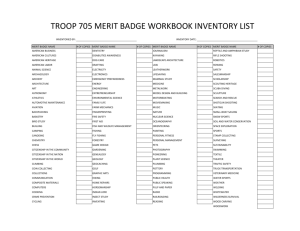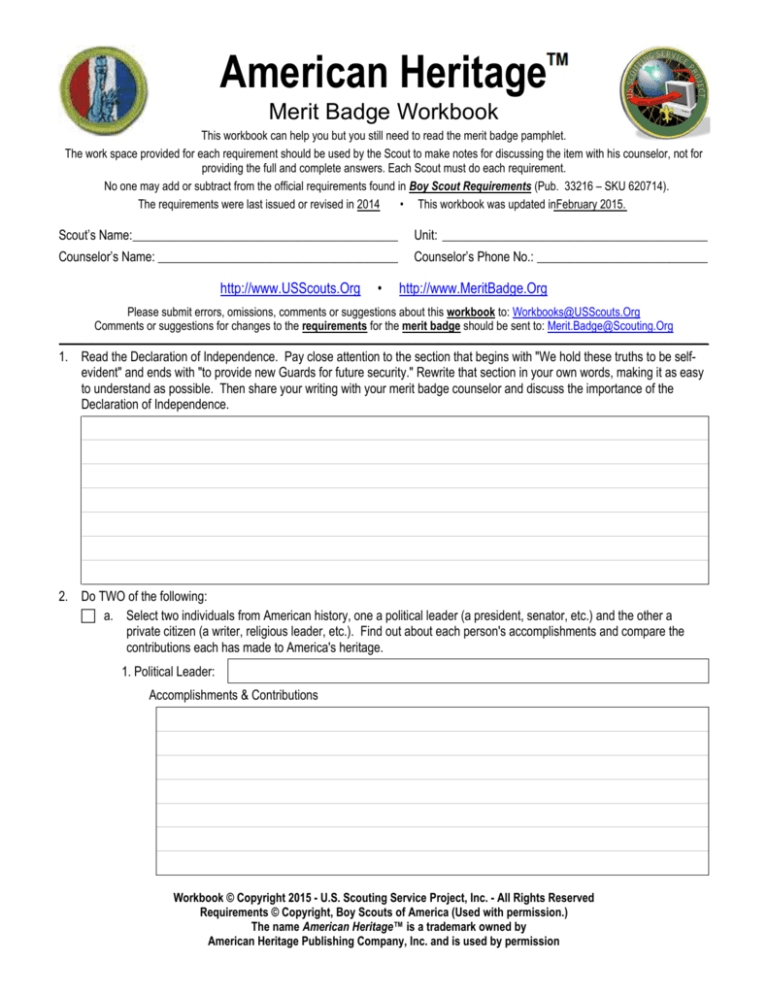
American Heritage
Merit Badge Workbook
This workbook can help you but you still need to read the merit badge pamphlet.
The work space provided for each requirement should be used by the Scout to make notes for discussing the item with his counselor, not for
providing the full and complete answers. Each Scout must do each requirement.
No one may add or subtract from the official requirements found in Boy Scout Requirements (Pub. 33216 – SKU 620714).
The requirements were last issued or revised in 2014
• This workbook was updated inFebruary 2015.
Scout’s Name:__________________________________________
Unit: __________________________________________
Counselor’s Name: ______________________________________
Counselor’s Phone No.: ___________________________
http://www.USScouts.Org
•
http://www.MeritBadge.Org
Please submit errors, omissions, comments or suggestions about this workbook to: Workbooks@USScouts.Org
Comments or suggestions for changes to the requirements for the merit badge should be sent to: Merit.Badge@Scouting.Org
______________________________________________________________________________________________________________________________________________
1. Read the Declaration of Independence. Pay close attention to the section that begins with "We hold these truths to be selfevident" and ends with "to provide new Guards for future security." Rewrite that section in your own words, making it as easy
to understand as possible. Then share your writing with your merit badge counselor and discuss the importance of the
Declaration of Independence.
2. Do TWO of the following:
a. Select two individuals from American history, one a political leader (a president, senator, etc.) and the other a
private citizen (a writer, religious leader, etc.). Find out about each person's accomplishments and compare the
contributions each has made to America's heritage.
1. Political Leader:
Accomplishments & Contributions
Workbook © Copyright 2015 - U.S. Scouting Service Project, Inc. - All Rights Reserved
Requirements © Copyright, Boy Scouts of America (Used with permission.)
The name American Heritage™ is a trademark owned by
American Heritage Publishing Company, Inc. and is used by permission
American Heritage™
Scout's Name: ________________________
2. Private Citizen:
Accomplishments & Contributions
b. With your counselor's approval, choose an organization that has promoted some type of positive change in
American society.
Find out why the organization believed this change was necessary and how it helped to accomplish the change.
Why:
How:
Discuss how this organization is related to events or situations from America's past.
American Heritage™ - Merit Badge Workbook
Page. 2 of 15
American Heritage™
Scout's Name: ________________________
c. With your counselor's approval, interview two veterans of the U.S. military. Find out what their experiences were
like. Ask the veterans what they believe they accomplished.
Veteran 1:
Experiences & accomplishments
Veteran 2:
Experiences & accomplishments
d. With your counselor's approval, interview three people in your community of different ages and occupations. Ask
these people what America means to them, what they think is special about this country, and what American
traditions they feel are important to preserve.
Person 1:
What America means to them
What do they think is special about this country?
American Heritage™ - Merit Badge Workbook
Page. 3 of 15
American Heritage™
Scout's Name: ________________________
What American traditions are important to preserve?
Person 2:
What America means to them
What do they think is special about this country?
What American traditions are important to preserve?
Person 3:
What America means to them
American Heritage™ - Merit Badge Workbook
Page. 4 of 15
American Heritage™
Scout's Name: ________________________
What do they think is special about this country?
What American traditions are important to preserve?
3. Do the following:
a.
Select a topic that is currently in the news.
Describe to your counselor what is happening.
Explain how today's events are related to or affected by the events and values of America's past.
American Heritage™ - Merit Badge Workbook
Page. 5 of 15
American Heritage™
Scout's Name: ________________________
b. For each of the following, describe its adoption, tell about any changes since its adoption, and explain how each one
continues to influence Americans today: the flag, the Pledge of Allegiance, the seal, the motto, and the national
anthem.
The Flag:
Adoption
Changes
Influence today
The Pledge of Allegiance:
Adoption
Changes
Influence today
American Heritage™ - Merit Badge Workbook
Page. 6 of 15
American Heritage™
Scout's Name: ________________________
The Seal:
Adoption
Changes
Influence today
The Motto:
Adoption
Changes
Influence today
American Heritage™ - Merit Badge Workbook
Page. 7 of 15
American Heritage™
Scout's Name: ________________________
The National Anthem:
Adoption
Changes
Influence today
c. Research your family's history. Find out how various events and situations in American history affected your family.
If your family immigrated to America, tell the reasons why. Share what you find with your counselor.
American Heritage™ - Merit Badge Workbook
Page. 8 of 15
American Heritage™
Scout's Name: ________________________
4. Do TWO of the following:
a. Explain what is meant by the National Register of Historic Places.
Describe how a property becomes eligible for listing.
Make a map of your local area, marking the points of historical interest.
American Heritage™ - Merit Badge Workbook
Page. 9 of 15
American Heritage™
Scout's Name: ________________________
Tell about any National Register properties in your area. Share the map with your counselor, and describe the
historical points you have indicated.
b. Research an event of historical importance that took place in or near your area. If possible, visit the place. Tell your
counselor about the event and how it affected local history.
Describe how the area looked then and what it now looks like.
Then
Now
American Heritage™ - Merit Badge Workbook
Page. 10 of 15
American Heritage™
Scout's Name: ________________________
c. Find out when, why, and how your town or neighborhood started, and what ethnic, national, or racial groups played
a part.
When:
Why:
How
What groups:
Find out how the area has changed over the past 50 years and try to explain why.
d. Take an active part in a program about an event or person in American history. Report to your counselor about the
program, the part you took, and the subject.
American Heritage™ - Merit Badge Workbook
Page. 11 of 15
American Heritage™
Scout's Name: ________________________
e. Visit a historic trail or walk in your area. __________________________________________________________
After your visit, share with your counselor what you have learned. Discuss the importance of this location and
explain why you think it might qualify for National Register listing.
5. Do ONE of the following:
a. Watch two motion pictures (with the approval and permission of your counselor and parent) that are set in some period
of American history. Describe to your counselor how accurate each film is with regard to the historical events depicted
and also with regard to the way the characters are portrayed.
Film 1:
Period
Accuracy of time
Accuracy of characters
Film 2:
Period
Accuracy of time
Accuracy of characters
b. Read a biography (with your counselor's approval) of someone who has made a contribution to America's heritage. Tell
some things you admire about this individual and some things you do not admire.
Explain why you think this person has made a positive or a negative contribution to America's heritage.
American Heritage™ - Merit Badge Workbook
Page. 12 of 15
American Heritage™
Scout's Name: ________________________
c. Listen to recordings of popular songs from various periods of American history. Share five of these songs with your
counselor, and describe how each song reflects the way people felt about the period in which it was popular. If a
recording is not available, have a copy of the lyrics available.
Song 1.
Song 2.
Song 3.
Song 4.
Song 5.
American Heritage™ - Merit Badge Workbook
Page. 13 of 15
American Heritage™
Scout's Name: ________________________
6. Discuss with your counselor the career opportunities in American heritage.
Pick one that interests you and explain how to prepare for this career.
Career
Discuss what education and training are required for this career.
Education
Training
Requirement resources can be found here:
http://www.meritbadge.org/wiki/index.php/American Heritage#Requirement resources
American Heritage™ - Merit Badge Workbook
Page. 14 of 15
Important excerpts from the Guide To Advancement - 2013, No. 33088 (SKU-618673)
[1.0.0.0] — Introduction
The current edition of the Guide to Advancement is the official source for administering advancement in all Boy Scouts of America programs: Cub
Scouting, Boy Scouting, Varsity Scouting, Venturing, and Sea Scouts. It replaces any previous BSA advancement manuals, including Advancement
Committee Policies and Procedures, Advancement and Recognition Policies and Procedures, and previous editions of the Guide to Advancement.
[Page 2, and 5.0.1.4] — Policy on Unauthorized Changes to Advancement Program
No council, committee, district, unit, or individual has the authority to add to, or subtract from, advancement requirements. There are limited
exceptions relating only to youth members with special needs. For details see section 10, “Advancement for Members With Special Needs”.
[Page 2] — The “Guide to Safe Scouting” Applies
Policies and procedures outlined in the Guide to Safe Scouting, No. 34416, apply to all BSA activities, including those related to advancement and
Eagle Scout service projects.
[7.0.3.1] — The Buddy System and Certifying Completion
A youth member must not meet one-on-one with an adult. Sessions with counselors must take place where others can view the interaction, or the
Scout must have a buddy: a friend, parent, guardian, brother, sister, or other relative—or better yet, another Scout working on the same badge—along
with him attending the session.
When the Scout meets with the counselor, he should bring any required projects. If these cannot be transported, he should present evidence, such as
photographs or adult verification. His unit leader, for example, might state that a satisfactory bridge or tower has been built for the Pioneering merit
badge, or that meals were prepared for Cooking. If there are questions that requirements were met, a counselor may confirm with adults involved.
Once satisfied, the counselor signs the blue card using the date upon which the Scout completed the requirements, or in the case of partials, initials
the individual requirements passed.
Note that from time to time, it may be appropriate for a requirement that has been met for one badge to also count for another. See “Fulfilling More
Than One Requirement With a Single Activity,” 4.2.3.6.
[7.0.3.2] — Group Instruction
It is acceptable—and sometimes desirable—for merit badges to be taught in group settings. This often occurs at camp and merit badge midways or
similar events. Interactive group discussions can support learning. The method can also be attractive to “guest experts” assisting registered and
approved counselors. Slide shows, skits, demonstrations, panels, and various other techniques can also be employed, but as any teacher can attest,
not everyone will learn all the material.
There must be attention to each individual’s projects and his fulfillment of all requirements. We must know that every Scout —actually and
personally— completed them. If, for example, a requirement uses words like “show,” “demonstrate,” or “discuss,” then every Scout must do that. It is
unacceptable to award badges on the basis of sitting in classrooms watching demonstrations, or remaining silent during discussions.
It is sometimes reported that Scouts who have received merit badges through group instructional settings have not fulfilled all the requirements. To
offer a quality merit badge program, council and district advancement committees should ensure the following are in place for all group instructional
events.
Merit badge counselors are known to be registered and approved.
Any guest experts or guest speakers, or others assisting who are not registered and approved as merit badge counselors, do not accept the
responsibilities of, or behave as, merit badge counselors, either at a group instructional event or at any other time. Their service is temporary, not
ongoing.
Counselors agree not to assume prerequisites have been completed without some level of evidence that the work has been done. Pictures and
letters from other merit badge counselors or unit leaders are the best form of prerequisite documentation when the actual work done cannot be
brought to the camp or site of the merit badge event.
There is a mechanism for unit leaders or others to report concerns to a council advancement committee on summer camp merit badge programs,
group instructional events, and any other merit badge counseling issues—especially in instances where it is believed BSA procedures are not
followed. See “Reporting Merit Badge Counseling Concerns,” 11.1.0.0.
There must be attention to each individual’s projects and his fulfillment of all requirements. We must know that every Scout—actually and
personally—completed them.
[7.0.3.3] — Partial Completions
A Scout need not pass all the requirements of one merit badge with the same counselor. It may be that due to timing or location issues, etc., he must
meet with a different counselor to finish the badge. The Application for Merit Badge has a place to record what has been finished—a “partial.” In the
center section on the reverse of the blue card, the counselor initials for each requirement passed. In the case of a partial completion, the counselor
does not retain his or her portion of the card. A subsequent counselor may choose not to accept partial work, but this should be rare. A Scout, if he
believes he is being treated unfairly, may work with his unit leader to find another counselor. An example for the use of a signed partial would be to
take it to camp as proof of prerequisites. Partials have no expiration except the Scout’s 18th birthday. Units, districts, or councils shall not establish
other expiration dates for partial merit badges.
[7.0.4.8] — Unofficial Worksheets and Learning Aids
Worksheets and other materials that may be of assistance in earning merit badges are available from a variety of places including unofficial sources
on the Internet and even troop libraries. Use of these aids is permissible as long as the materials can be correlated with the current requirements that
Scouts must fulfill. Completing “worksheets” may suffice where a requirement calls for something in writing, but this would not work for a requirement
where the Scout must discuss, tell, show, or demonstrate, etc. Note that Scouts shall not be required to use these learning aids in order to complete a
merit badge.
Attachment
(NOTE: It is not necessary to print this page.)
Page 15 of 15

